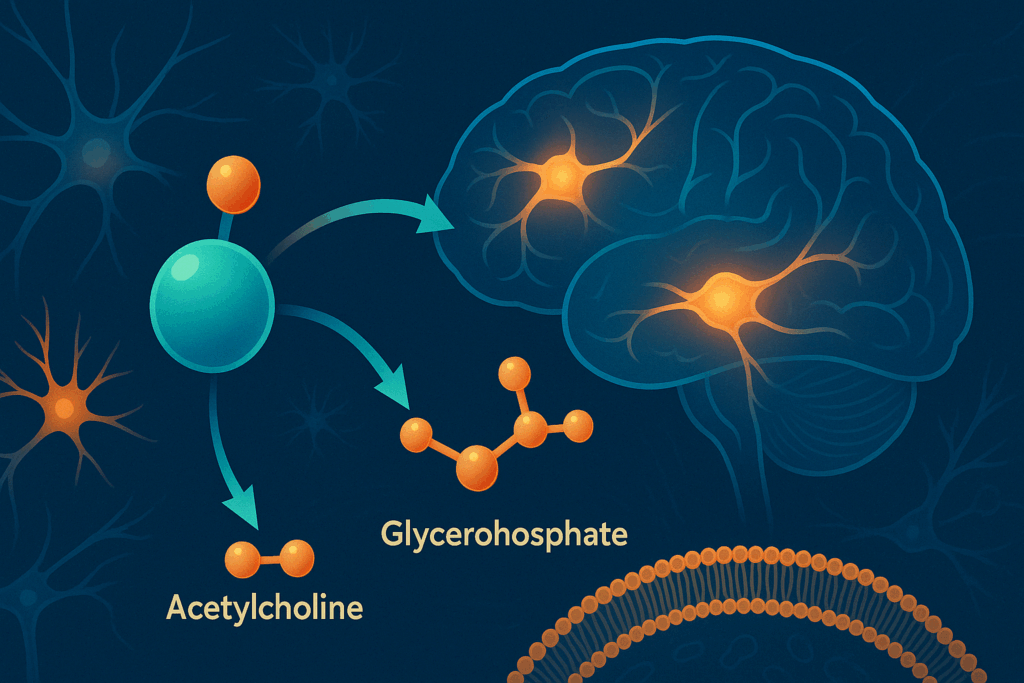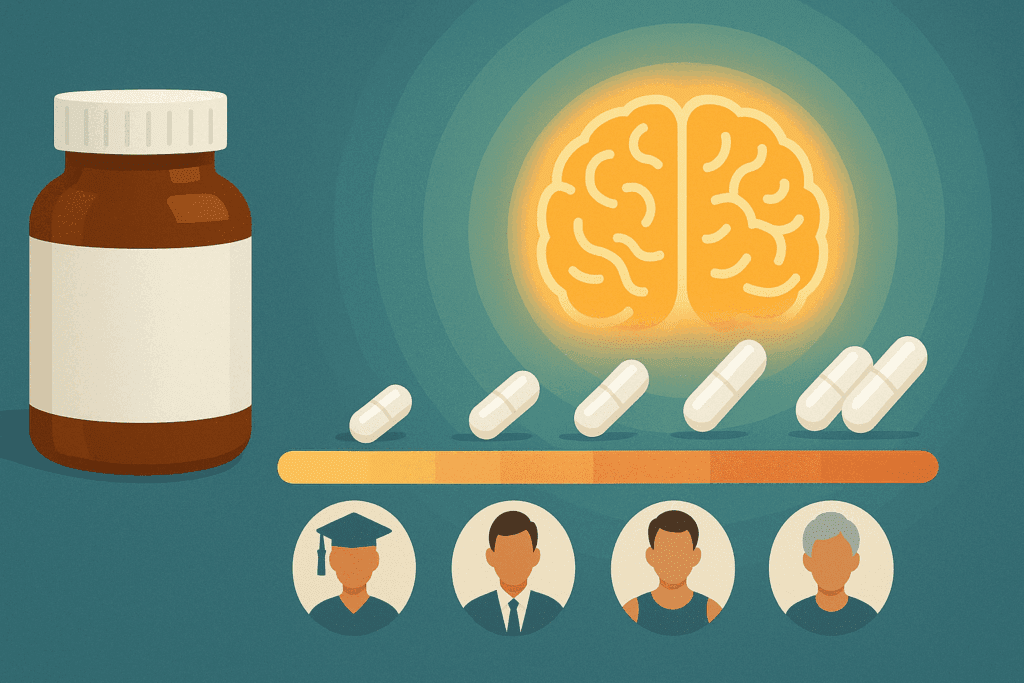In an era where cognitive performance is relentlessly tested by information overload, stress, and digital saturation, the pursuit of mental clarity and focus has never been more urgent. Among the array of nootropic compounds that have captured the attention of researchers and health-conscious individuals alike, Alpha GPC stands out for its scientifically supported benefits and multifaceted mechanism of action. Known formally as alpha glycerylphosphorylcholine, Alpha GPC is more than just a supplement—it is a clinically validated enhancer of brain function, particularly prized for its role in improving attention, memory, and reducing the persistent haze known as brain fog.
You may also like: Citicoline vs Alpha GPC: Which Choline Source Offers the Greatest Cognitive Support?
Alpha GPC is a natural choline compound found in the brain and in various food sources in smaller quantities. When consumed as a supplement, it crosses the blood-brain barrier efficiently and serves as a direct precursor to acetylcholine, a neurotransmitter integral to learning and memory. The benefits of Alpha GPC extend far beyond short-term boosts in concentration; regular use has been associated with improved neuroplasticity, greater mental stamina, and enhanced mood regulation. For individuals navigating high-stress environments, dealing with age-related cognitive decline, or simply striving for peak mental performance, Alpha GPC offers a uniquely robust solution grounded in neuroscience.

Understanding Alpha GPC: Chemical Profile and Neurological Impact
At its core, Alpha GPC is a phospholipid choline compound that plays a fundamental role in the construction of cell membranes and the modulation of neurotransmitters. As alpha gpc choline alfoscerate, it exists in both synthetic and natural forms, with most supplements derived from purified soy lecithin or produced via enzymatic processes for optimal absorption. Once ingested, Alpha GPC is rapidly metabolized into free choline and glycerophosphate, both of which serve critical roles in cellular repair and neurotransmission.
The conversion of Alpha GPC into acetylcholine is particularly important for memory encoding, attention span, and executive functioning. Acetylcholine facilitates signal transmission between neurons and underpins various cognitive tasks, including logical reasoning, verbal fluency, and the formation of long-term memories. Through this mechanism, the alpha gpc supplement exerts its most notable effects on mental performance. Additionally, Alpha GPC supports the regeneration of phosphatidylcholine, a key component of neuronal membranes, thereby enhancing overall brain resilience.
Emerging research suggests that Alpha GPC also increases dopamine levels in the prefrontal cortex, which may explain its mood-lifting and motivation-boosting properties. This dopaminergic effect has led to growing interest in using Alpha GPC for neuropsychiatric conditions such as alpha gpc depression and ADHD, where executive dysfunction and motivational deficits are common. Furthermore, Alpha GPC appears to support mitochondrial function, contributing to improved energy metabolism within brain cells and greater resistance to cognitive fatigue.

Alpha GPC Benefits for Focus and Mental Clarity
Among the most celebrated alpha gpc benefits is its ability to sharpen focus and dissolve mental fog. Mental clarity—the state of cognitive lucidity and unimpeded thought processing—is essential not only for academic and professional achievement but also for emotional regulation and interpersonal communication. Individuals suffering from brain fog often describe it as a persistent sense of detachment or dullness, where even routine tasks require considerable effort. In this context, Alpha GPC acts as a neurological catalyst, rejuvenating attention circuits and restoring cognitive efficiency.
The compound’s effectiveness in promoting alpha gpc mental clarity has been attributed to its dual action: increasing acetylcholine availability and fortifying neuronal integrity. In practical terms, users often report experiencing fewer lapses in concentration, quicker recall of information, and a greater ability to sustain mental effort across long periods. For those dealing with cognitive overload or multitasking fatigue, Alpha GPC can restore a sense of clarity and mental agility that feels both empowering and sustainable.
Notably, the alpha glycerylphosphorylcholine benefits are not limited to those experiencing clinical impairment. High-functioning individuals such as entrepreneurs, graduate students, and competitive athletes have turned to Alpha GPC to gain a mental edge in demanding environments. Its rapid onset and synergistic compatibility with other nootropics make it a staple in cognitive enhancement regimens. In clinical trials, Alpha GPC has demonstrated superior efficacy compared to other choline sources, highlighting its status as one of the best alpha gpc supplement options available for achieving sharp mental focus.

Alpha GPC for Brain Fog: Mechanisms of Relief
Brain fog is not a medically defined condition, but it represents a constellation of symptoms that profoundly impact quality of life: forgetfulness, sluggish thinking, confusion, and diminished mental energy. Alpha GPC offers targeted relief by addressing several of the neurochemical imbalances associated with this cognitive malaise. Its primary advantage lies in enhancing acetylcholine synthesis, thereby improving neuronal communication and signal clarity across synapses.
One of the lesser-known benefits of the alpha gpc supplement is its role in combating inflammation and oxidative stress in the brain. Chronic neuroinflammation is a common contributor to cognitive cloudiness and is often exacerbated by poor diet, sleep deprivation, and environmental toxins. Alpha GPC has shown potential in modulating inflammatory cytokines and supporting antioxidant defenses, thus contributing to a clearer, more vibrant mental state.
The question “what does alpha gpc do” finds further depth when exploring its mitochondrial support functions. Brain fog often correlates with mitochondrial dysfunction and impaired glucose metabolism in neurons. Alpha GPC helps sustain cellular energy levels by supporting phospholipid synthesis and enhancing ATP production. These effects can be particularly noticeable in individuals recovering from illness, burnout, or those transitioning to more cognitively demanding phases of life.
For those wondering, “does alpha gpc work for brain fog?” the anecdotal and empirical evidence continues to build. From qualitative user testimonials to randomized controlled studies, Alpha GPC consistently demonstrates measurable improvements in mental clarity and subjective alertness. While it is not a panacea, its strategic use can significantly reduce cognitive drag and promote a more consistent state of mental engagement.

Optimizing Alpha GPC Dosage for Cognitive Enhancement
Determining the ideal alpha gpc dosage depends on various factors including age, weight, cognitive goals, and concurrent supplementation. Clinical studies often use doses ranging from 300 mg to 1,200 mg per day, with 600 mg being a commonly recommended benchmark for noticeable cognitive effects. The compound is well-tolerated across this range, though higher doses are typically reserved for individuals recovering from stroke or neurological trauma.
Understanding how much alpha gpc per day is appropriate also involves timing. Some individuals prefer taking Alpha GPC first thing in the morning to jumpstart mental clarity, while others find benefit in a pre-workout or pre-study context. For those seeking sustained focus throughout the day, splitting the dose—such as 300 mg in the morning and 300 mg in the early afternoon—can offer more balanced cognitive support. This approach also reduces the risk of tolerance build-up, enhancing long-term efficacy.
For newcomers, beginning with an alpha gpc 50 milligram dose can serve as a microdosing introduction, particularly when stacking with other nootropics. While such small doses are unlikely to produce dramatic effects in isolation, they can contribute to cumulative cognitive benefits. It’s important to consult with a healthcare provider when determining your alpha gpc dose, especially if you are managing chronic health conditions or taking medications that affect neurotransmitter levels.
Timing, Cycling, and Stack Compatibility
As with many nootropics, timing and cycling are crucial to maintaining Alpha GPC’s effectiveness. A common question among users is, “do I need to cycle alpha gpc?” The answer depends largely on usage patterns and individual response. While Alpha GPC does not exhibit classic habituation or dependency traits, periodic cycling—such as five days on, two days off—can prevent receptor desensitization and preserve sensitivity to acetylcholine.
For those incorporating Alpha GPC into broader nootropic stacks, timing can influence synergy. Taking Alpha GPC about 30 to 60 minutes before cognitively demanding tasks or physical workouts can yield peak plasma choline levels at just the right moment. This makes it especially useful for students before exams, professionals ahead of presentations, or athletes during high-intensity training sessions.
When paired with racetams or adaptogens, Alpha GPC enhances the cholinergic effects of the stack, often leading to more pronounced improvements in focus, mood, and motivation. This is particularly true for stacks that include aniracetam, noopept, or bacopa monnieri. Users seeking a holistic cognitive enhancement approach often regard alphasize alpha gpc or alphasize alpha glyceryl phosphoryl choline as premium formulations due to their bioavailability and purity standards.

Applications of Alpha GPC in Mental Health and Clinical Contexts
While much of the mainstream conversation around Alpha GPC centers on healthy individuals seeking cognitive optimization, its therapeutic applications are equally compelling. Studies have investigated the use of Alpha GPC for conditions such as stroke recovery, Alzheimer’s disease, and alpha gpc depression. In these contexts, Alpha GPC is valued not only for its acetylcholine-boosting properties but also for its neuroprotective and neurorestorative capacities.
Alpha GPC depression studies suggest that it can enhance mood by modulating dopaminergic and cholinergic pathways. Though not a replacement for standard antidepressant therapy, Alpha GPC may serve as a valuable adjunct, especially in cases involving cognitive symptoms or treatment-resistant conditions. Similarly, early evidence indicates that alpha gpc anxiety relief may result from improved executive control and emotional regulation, both of which are mediated by acetylcholine.
Alpha GPC adhd research, though still emerging, is showing promise as well. Many individuals with ADHD exhibit low acetylcholine activity, and Alpha GPC’s ability to enhance this neurotransmitter may contribute to better attention span and impulse control. Additionally, Alpha GPC’s support of mitochondrial function can aid in addressing the energy regulation deficits often seen in ADHD populations. These findings position Alpha GPC as a potential adjunct therapy in a range of neuropsychiatric contexts.

Physical Performance, Recovery, and Pre-Workout Utility
Though primarily celebrated for its cognitive impact, Alpha GPC benefits pre workout performance and physical endurance have gained traction in recent years. As a choline donor, Alpha GPC facilitates the release of growth hormone and supports neuromuscular coordination, making it attractive to athletes and fitness enthusiasts. Some studies report improved power output and reaction time in individuals taking Alpha GPC before high-intensity training.
This aspect of what alpha gpc is good for adds to its reputation as a dual-purpose supplement, enhancing both brain and body. Users seeking to maximize both cognitive and physical output often find that Alpha GPC provides a balanced energy lift without the jitteriness associated with stimulants. It also aids in recovery by reducing exercise-induced oxidative stress and supporting muscular repair through enhanced neurotransmitter function.
While considering alpha gpc side effects in the context of athletic use, most individuals tolerate the supplement well. Minor side effects such as headaches or gastrointestinal discomfort may occur, particularly when taken on an empty stomach or at excessively high doses. For this reason, it is advisable to start with moderate dosages and assess tolerance over time.
Safety, Side Effects, and Long-Term Use Considerations
A critical question for health-conscious users is: is alpha gpc safe for regular consumption? The current body of research and clinical data suggests that Alpha GPC is well-tolerated across a wide range of doses, with minimal adverse effects reported. Nevertheless, users should remain informed about potential side effects and contraindications. Mild symptoms such as dizziness, nausea, or headaches can occasionally arise, particularly in sensitive individuals or those exceeding the recommended alpha gpc dose.
Long-term studies indicate that Alpha GPC does not negatively affect liver or kidney function when used appropriately. However, individuals with pre-existing cardiovascular conditions should consult a medical professional, as Alpha GPC may influence blood pressure and vascular tone. It is also worth noting that combining Alpha GPC with other cholinergic agents may amplify effects, necessitating careful dosage calibration.
For those considering whether to use glycerophosphocholine supplement forms regularly, the overall risk profile remains favorable. As always, sourcing from reputable manufacturers that provide third-party testing—such as alphasize a gpc—ensures product purity and safety. When used as part of a well-rounded cognitive health strategy, Alpha GPC offers a compelling mix of efficacy and tolerability for long-term mental vitality.
Frequently Asked Questions: Alpha GPC for Mental Clarity, Focus, and Brain Fog Relief
1. Do I need to cycle Alpha GPC to avoid tolerance or diminished effects over time?
Yes, many users report that cycling Alpha GPC can help maintain its cognitive benefits over extended periods. While Alpha GPC is not habit-forming, consistent daily use without breaks might lead to diminishing returns, particularly regarding focus and memory enhancement. To preserve sensitivity and maximize alpha GPC mental clarity, a common cycling pattern involves taking it for five days followed by two days off. Another approach is using it only on high-demand cognitive days, such as during exams or intensive work projects. If you’re wondering, “do I need to cycle Alpha GPC?”—the answer depends on your goals and how your body responds to long-term use.
2. What makes Alpha GPC different from other nootropics aimed at mental clarity?
Alpha GPC stands out because it delivers choline in a highly bioavailable form, directly supporting acetylcholine synthesis. Unlike general choline sources or synthetic stimulants, Alpha GPC supplement formulations work synergistically with the brain’s natural chemistry. The result is smoother, more sustained cognitive energy without the jitteriness associated with some nootropics. Alpha GPC benefits also include enhanced neuroplasticity, which may aid in faster learning and improved memory consolidation. For professionals and students alike, this glycerophosphocholine supplement offers a targeted path to sharper mental acuity.
3. How long does Alpha GPC last once taken, and when should I time my dosage?
The duration of effect for Alpha GPC varies slightly by individual metabolism, but most users report noticeable cognitive support within 30 to 60 minutes of ingestion. These effects typically last four to six hours, making timing critical for tasks requiring prolonged focus. For optimal results, consider when to take Alpha GPC based on your schedule—morning use is ideal for work or study, while afternoon doses may help combat cognitive fatigue. Athletes often use Alpha GPC benefits pre workout due to its neuromuscular support and alertness boost. Understanding how long does Alpha GPC last can help you plan your intake for peak performance windows.
4. What does Alpha GPC do that supports emotional as well as cognitive health?
Beyond boosting memory and mental clarity, Alpha GPC plays a subtle yet important role in emotional regulation. By increasing acetylcholine levels, it indirectly modulates dopamine and serotonin pathways, potentially supporting a more stable mood. Users dealing with Alpha GPC depression symptoms often find improved emotional balance alongside enhanced cognitive function. Although it’s not a primary treatment for mood disorders, its effect on neurotransmitter synthesis may help buffer stress-induced brain fog. For those juggling high cognitive loads with emotional strain, this dual-action support is part of what makes Alpha GPC supplement routines appealing.
5. Can Alpha GPC be used safely alongside other cognitive enhancers or medications?
Alpha GPC is generally considered safe and well-tolerated, but interactions can occur with certain medications or other nootropics. For example, stacking Alpha GPC with racetams like aniracetam may enhance synaptic efficiency, but dosing must be carefully managed. Consulting a healthcare professional is essential if you’re combining Alpha GPC with antidepressants or ADHD medications, as it may influence neurotransmitter activity. Many users seeking the best Alpha GPC supplement pair it with omega-3 fatty acids to support membrane fluidity and cognitive performance. Always assess your full supplement regimen to determine: is Alpha GPC safe in your unique context?
6. What are the lesser-known benefits of Alpha Glycerylphosphorylcholine for professionals in high-pressure environments?
One often overlooked advantage of Alpha Glycerylphosphorylcholine benefits is its potential to reduce cognitive burnout. For professionals facing constant deadlines, presentations, or analytical tasks, the mental endurance supported by Alpha GPC can be transformative. It enhances both short-term processing speed and long-term retention, which is why Alpha GPC choline alfoscerate is popular in competitive industries like finance, law, and engineering. Additionally, Alpha GPC mental clarity contributes to better decision-making under stress. In high-stakes environments, small cognitive edges can lead to substantial long-term gains.
7. Is there an ideal Alpha GPC dosage for addressing brain fog and attention difficulties?
The typical Alpha GPC dose for cognitive enhancement ranges from 300 mg to 600 mg daily, depending on individual tolerance and goals. Some users report better outcomes by splitting the dose—for instance, taking Alpha GPC 50 or 150 mg in the morning and the rest later in the day. If you’re exploring how much Alpha GPC per day is right for you, start low and gradually increase until desired effects are achieved. For those managing attention issues or Alpha GPC ADHD symptoms, lower doses may suffice when combined with structured routines. Personalized experimentation, ideally under professional guidance, ensures maximum benefit with minimal side effects.
8. Can Alpha GPC help with anxiety or does it risk overstimulating the nervous system?
The impact of Alpha GPC on anxiety is nuanced and varies among individuals. For some, improved cognitive function and memory result in less anxiety due to increased confidence and reduced mental strain. However, because Alpha GPC enhances cholinergic activity, sensitive users may experience heightened alertness that could mimic or exacerbate anxiety. Users exploring Alpha GPC anxiety effects should begin with modest doses and monitor their emotional state closely. For most, the answer to “is Alpha GPC safe?” is yes—but personal biochemistry must always be considered when introducing a new supplement.
9. What makes Alphasize Alpha GPC or other branded formulations potentially superior?
Branded versions like Alphasize Alpha GPC often undergo additional purity testing and offer verified potency, which can improve absorption and reliability. Alphasize Alpha Glyceryl Phosphoryl Choline in particular is widely used in sports and clinical settings due to its consistency and bioavailability. Some studies suggest that branded forms produce faster and more stable increases in acetylcholine levels, which may enhance both mental clarity and physical performance. When evaluating the best Alpha GPC supplement, purity, third-party testing, and manufacturing standards are key indicators of quality. This is especially relevant when cognitive demands are high and consistency is critical.
10. What is Alpha GPC used for beyond cognitive enhancement in the general population?
Although most people associate Alpha GPC with nootropic performance, its applications extend into clinical, athletic, and therapeutic domains. In stroke rehabilitation, Alpha GPC choline alfoscerate is sometimes used to support cognitive recovery and neuroprotection. In sports nutrition, it enhances muscular power output, reaction time, and neuromuscular coordination—making it attractive for performance-driven individuals. The broader question of what is Alpha GPC good for leads us to explore its role in aging, where it may slow cognitive decline and support long-term brain resilience. Whether you’re curious about alpha glycerylphosphorylcholine benefits in everyday life or high-performance scenarios, its versatility continues to expand with emerging research.
Conclusion: Why Alpha GPC Deserves a Place in Your Cognitive Toolkit
In the evolving landscape of cognitive enhancement, Alpha GPC emerges as a scientifically grounded, multifaceted ally for anyone seeking sharper focus, improved memory, and relief from brain fog. From its role in acetylcholine synthesis to its contributions to membrane integrity and mitochondrial function, the alpha glycerylphosphorylcholine benefits are extensive and well-supported by research. Whether you’re navigating the academic rigor of graduate school, striving to meet demanding workplace deadlines, or recovering from cognitive burnout, Alpha GPC offers a reliable path to mental rejuvenation.
Its compatibility with a variety of nootropic stacks, neuroprotective qualities, and track record in both clinical and high-performance settings make it one of the best alpha gpc supplement options for those prioritizing brain health. The question “what is alpha gpc used for” is no longer confined to narrow definitions; instead, it encompasses a broad spectrum of applications from ADHD management to athletic enhancement. For those still asking “does alpha gpc work?” the evidence suggests a resounding yes, provided it is used thoughtfully, cycled when needed, and integrated into a holistic lifestyle approach.
Ultimately, Alpha GPC is not a quick fix but a powerful instrument in the pursuit of long-term cognitive resilience. Its capacity to restore clarity, sharpen focus, and enhance neurological well-being affirms its place in the modern nootropic repertoire. Whether you’re just beginning your cognitive optimization journey or refining an advanced biohacking stack, the strategic use of Alpha GPC can yield lasting mental dividends worthy of your attention.
Was this article helpful? Don’t let it stop with you. Share it right now with someone who needs to see it—whether it’s a friend, a colleague, or your whole network. And if staying ahead on this topic matters to you, subscribe to this publication for the most up-to-date information. You’ll get the latest insights delivered straight to you—no searching, no missing out.
Further Reading:
14 Remarkable Benefits of Alpha GPC + Dosage & How To Take It
Is Alpha-GPC the Best Form of Choline for Cognition?
Alpha-GPC: Benefits, Uses, Dosage, and Side Effects
Important Note: The information contained in this article is for general informational purposes only, and should not be construed as health or medical advice, nor is it intended to diagnose, prevent, treat, or cure any disease or health condition. Before embarking on any diet, fitness regimen, or program of nutritional supplementation, it is advisable to consult your healthcare professional in order to determine its safety and probable efficacy in terms of your individual state of health.
Regarding Nutritional Supplements Or Other Non-Prescription Health Products: If any nutritional supplements or other non-prescription health products are mentioned in the foregoing article, any claims or statements made about them have not been evaluated by the U.S. Food and Drug Administration, and such nutritional supplements or other health products are not intended to diagnose, treat, cure, or prevent any disease.


